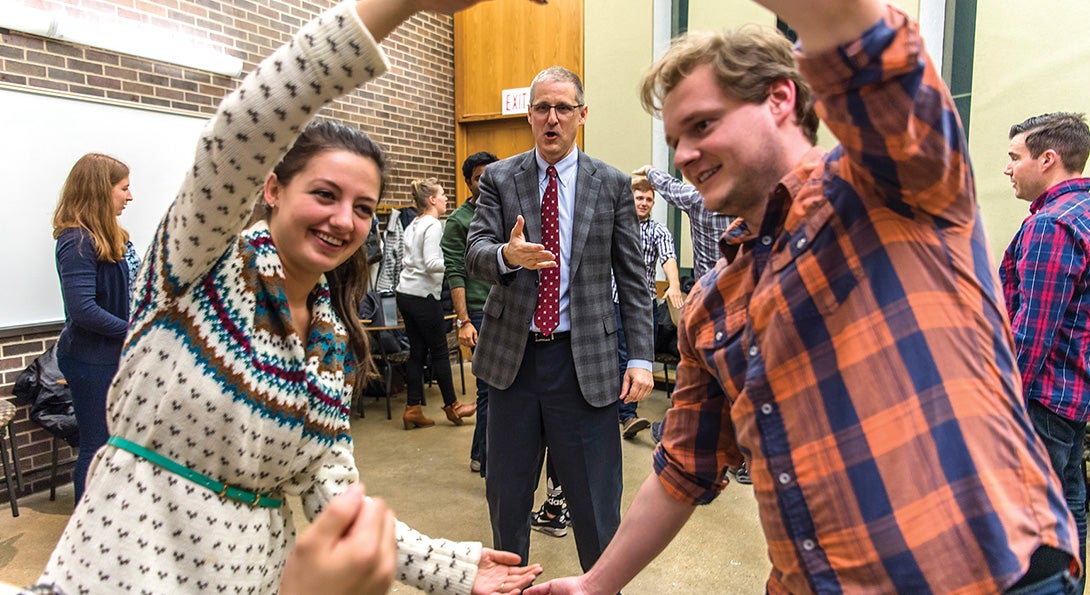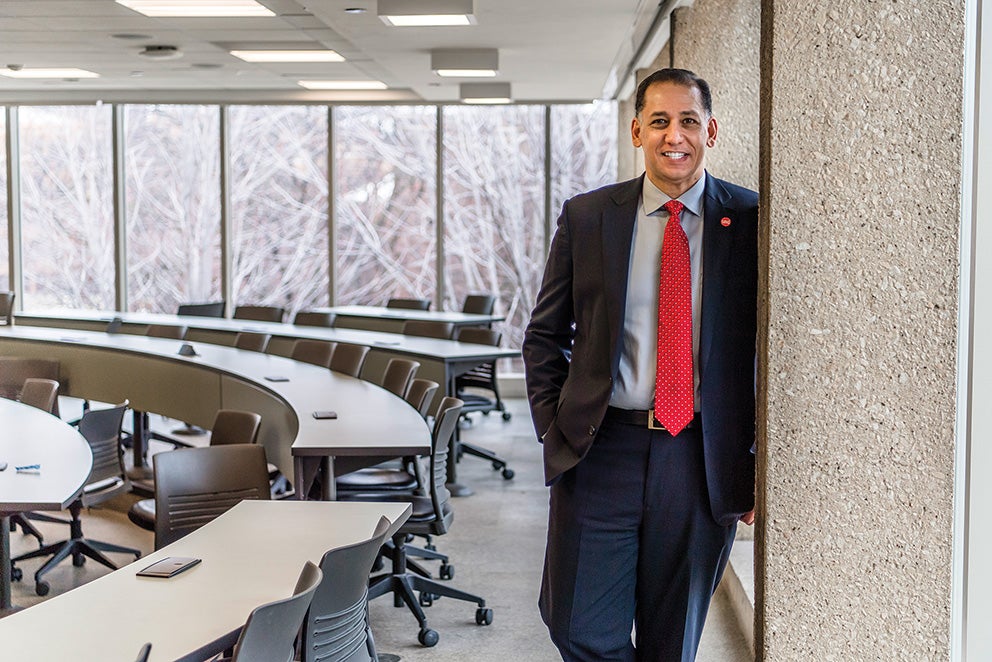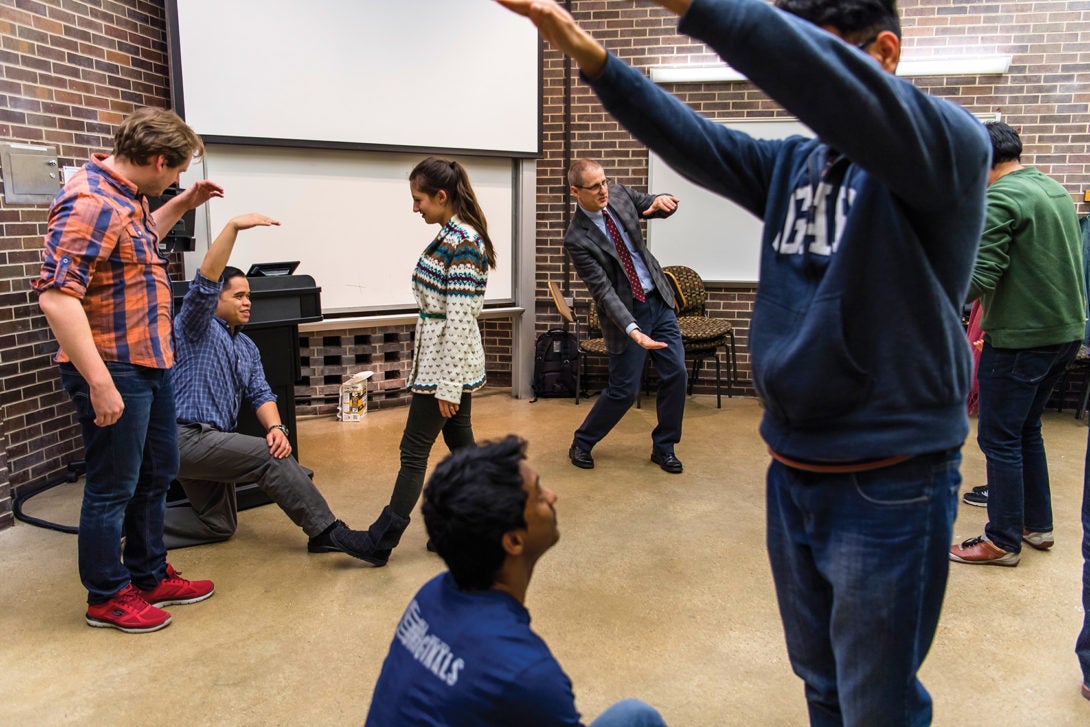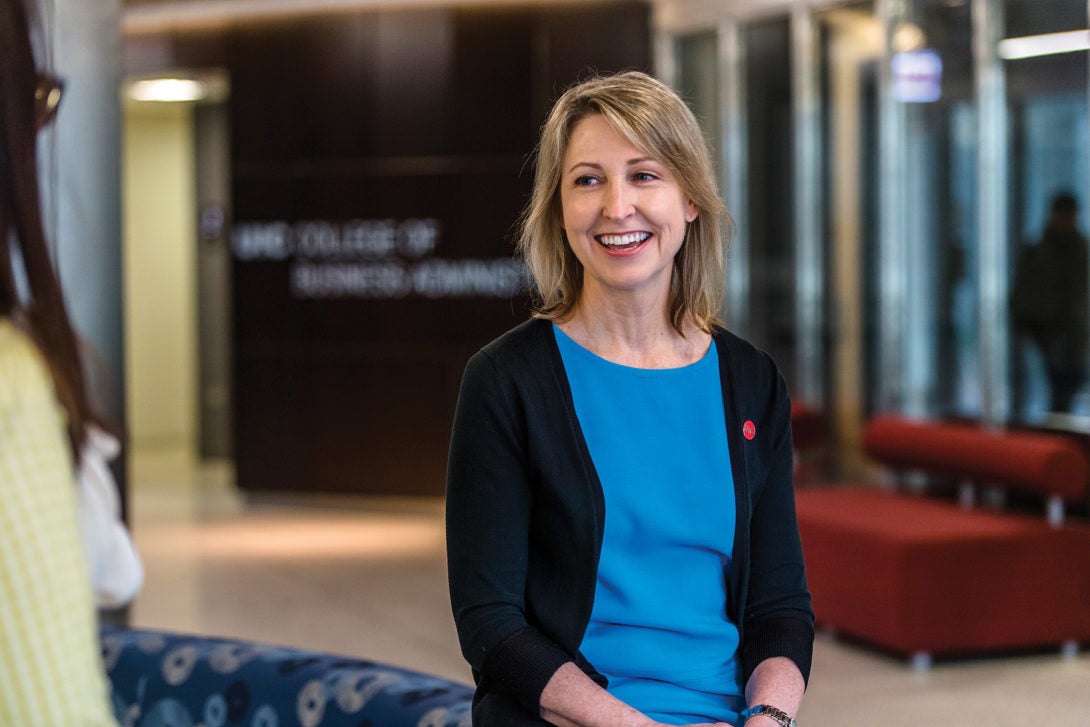First Impressions

Under Dean Michael Mikhail, the College of Business Administration is placing a greater emphasis on teaching students the soft skills needed to succeed
text Heading link

“Meet people, greet people. You’ve got 10 seconds to high-five everyone in the room. Now look at everybody; use the energy of your eyes. Don’t talk. Make longer eye contact. Feel free to laugh. Look at the color of their eyes. Stop and stare. Stay with it. Feel if it’s rude or intrusive. Now go back to normal contact. Walk. Stop. Now pick a partner.”
Maybe I’ve wandered into the wrong classroom. This can’t possibly be a course in UIC’s College of Business Administration. Chairs have been shoved against the walls. The 20-some students mill about awkwardly in the cleared space. The instructor, Michael Popowits, ’81 UI, MAS ’83 UI, now has the entire group pantomime letters of the alphabet with their partners. Hands shoot up to shape an “H.” One pair leans back to back to create a “K.”
For his next exercise, Popowits has them invent gestures, then mimic each other’s movements. “You’re looking at rapport, adjustments. Notice the rhythms and patterns. One follows, one leads. Okay, switch. Now switch back. Faster. Switch. Faster! Make it bigger. Bigger! Stop!”
The students take a breath and relax. Most look considerably more comfortable than they did half an hour ago when Popowits had them stow their books and backpacks and move into a circle. Which is kind of the point because this is indeed a class—a required class—in the CBA.
Popowits and his students are part of iLEAD—the Institute for Leadership Excellence and Development—established by Michael Mikhail, ’86 UI, MAS ’88 UI, when he became Dean of the business school in 2012. iLEAD’s mission is to improve management practices and leadership effectiveness. iLEAD accomplishes this through education (e.g., offering students professional development courses to enhance their practical job skills) and research (e.g., providing companies and organizations with actionable solutions to workplace challenges such as employee productivity and behavior).
text 2 Heading link

Improvisation comes to the classroom
“Think of it this way,” Mikhail says. “You come out of college, and for two years you’re doing entry-level work—heavy lifting, number crunching. Then the job’s going to change, and you’re going to have to manage people, meet clients, work with teams across the globe. That’s when you need the soft skills, the intangibles. That’s the toolbox that will take you through your second, third and fourth promotion.”
On paper, Mikhail may not seem the most likely person to shake up a business school. Previously an accounting professor and director of the School of Accountancy at Arizona State University, he published research articles in accounting journals with such titles as “Reactions to Dividend Changes Conditional on Earnings Quality” and “Security Analyst Experience and Post-Earnings Announcement Drift.” By his own admission, Mikhail had lived most of his previous life with little interest in the “toolbox” he’s pushing at UIC. “I was one of those kids in the back of the class who wanted to hide under his desk so I didn’t get called on,” he says. “If you’d asked me what I thought about this soft skills development a decade ago, I’d have laughed and not given it a second thought.”
By the time Mikhail arrived at UIC, he had changed. Personally, he had overcome his shyness. “It took 15 years to break out of my shell. One day I spoke up and the world didn’t come to an end,” he explains. “Honestly, I think it was that simple.”
Professionally, he was much more attuned to the needs of UIC CBA students. In visits to private-sector employers who hired CBA graduates, he frequently heard the same story. UIC business majors were having trouble. They were smart and hard-working, but it wasn’t always easy for them to transition into corporate environments. Many were first-generation college grads; their parents weren’t professionals; they often were not well-versed in the interpersonal skills needed to succeed. A disturbing number ended up leaving their jobs. In the midst of plotting what to do, Mikhail heard about a UIC faculty member, an accounting professor like himself, but also a big fan of improv—as in improvisation—made famous at The Second City in Chicago.
Popowits had his own unlikely background. With a master’s degree in accounting information systems, he, like Mikhail, was on the introverted end of the personality spectrum. That is until a friend persuaded him to drop by a Second City class. “It scared the heck out of me,” Popowits recalls. “I literally drove around the block four times, thinking, ‘I can’t do this!’ Looking back, I’m eternally grateful I finally parked and went in. Literally that day, my life began to change.”
As a result, Popowits quit his accounting job, took a “deep dive” into the improv world for several years, realized he loved the classroom as much as the stage and began teaching accounting at UIC in 1988, while offering executive coaching on the side. Convinced that improv would be a useful skill for business grads, Popowits piloted a stand-alone MBA class in 2008 designed for 20 people and evolved it into a core undergraduate class. “This is what I’ll do at UIC,” Popowits recalls thinking. “Teach accounting regularly, add an occasional improv class and coach on the side. I was set. Then, as I like to tell people, ‘We got the right Dean.’”
Dean Mikhail knocked on his door one day with a dream job offer. Mikhail’s plan was for Popowits to teach his improv class to every business student as the director of professional development, and start to build a program that would help define the CBA curriculum.
That was four years ago. Popowits has since won UIC’s top teaching awards, including a 2012 UIC Silver Circle Award and a 2015 Favorite MBA Award. His class is now a required eight-week course for incoming freshmen and is the core of the new curriculum known as the Professional Development Program. To meet demand for the course—there are 400 students in this year’s freshman class—and to keep class size to 20 students (“anything larger and you lose the sweet spot”), Popowits has hired four new instructors from vocations outside of academia with years of improv experience at Second City and other comedy clubs. “The proximity of UIC to the city is ideal, we couldn’t do it anywhere else,” he says. “There are tons of [Second City] alums who still work within a 50-mile radius [of UIC]. Chicago is the world home of improv.”
text 3 Heading link

The inclusion of improv into the business school curriculum is only one of several big changes championed by Mikhail. Another innovation is the UIC Business Scholars Program. Identified as academic high achievers, this group of approximately 150 students benefits from frequent seminars, special workshops and an executive speaker series. The biggest draw, however, is being part of a self-contained cohort during their time at UIC. “Being part of the Business Scholars Program enables these students to establish strong relationships among their peers and challenge each other,” says Professor Sandy Wayne, co-director of iLEAD’s research arm and faculty director of the Business Scholars Program.
Soft skills training
The emphasis on interpersonal skills is a common thread in both the Business Scholars Program and the PDP. The ability to be comfortable in social interactions is now a top priority at the school, and much is pinned on Popowits’ training. “Improv is the art of creative spontaneous response,” he explains. “When you don’t or can’t know what’s going to happen, it helps you step up with confidence.” For example, “How do you speak when you’re not exactly sure what you’re going to say? We [help] you learn how to be credible at a networking event, at an alumni gathering or a career fair.”
Those are the topics covered during students’ freshman year. Sophomore year, they get another dose of improv aimed at interview techniques and impromptu speaking. Junior year, the focus shifts to teamwork skills and civic engagement, and senior year is spent applying those skills to the transition into professional life. Mikhail is big on civic engagement, and has prioritized internships at non-profit organizations.
Although it is too new to assess the program’s long-term impact (it’s just completing its four-year rollout), anecdotal evidence suggests employers are noticing a difference. “We get lots of feedback from private-sector employers asking if we’ve changed the demographics of our students,” Mikhail says. “But we haven’t. They come from the same high schools with the same scores. All we’ve done is provide additional training to help them discover their intangible skills so that they’re more adept at using them.”
CBA Assistant Dean Tracy Warner, ’91 CBA, MBA ’06, hears much the same thing. “Employers wonder if we are admitting a higher caliber of students. And students are seeing the results in themselves; they’re reporting higher levels of confidence and life-changing experiences.
“It’s very exciting,” Warner continues. “In the old days, parents would say, ‘My child needs better communication skills. Should I spend the money on a Dale Carnegie course?’ Now we don’t even have to entertain those questions. That kind of training is included with their course work.”
But the CBA is doing more than relying on student feedback and anecdotal evidence to assess the PDP’s success. iLEAD’s research arm is documenting the effectiveness of these training methodologies aimed at enhancing students’ interpersonal and leadership competencies. In addition, iLEAD has partnered with companies and organizations to solve people-related workplace challenges by combining applied research and actionable solutions. In one project, Wayne and her team visited 250 Jason’s Deli restaurants to evaluate the impact of corporate servant leadership on employees.
Wayne continues to expand iLEAD’s services to Chicago-area companies, but her efforts are increasingly focused on Mikhail’s PDP curriculum and efforts to document its efficacy.
“The idea is to track results of the program and provide quantitative feedback on its impact,” Wayne says. “We are doing this through several approaches, including surveying students before and after the training in order to document changes such as increased self-confidence and emotional intelligence.” In addition, Wayne and her team are videotaping students’ presentations before and after the training to ascertain their improvement in verbal and non-verbal skills. “A unique feature of our assessment program is that it occurs throughout students’ time at UIC and several years following their graduation,” she adds. “That enables us to examine how the training is benefitting students as they start their careers.”
text 4 Heading link
CBA gains attention
Improved social confidence is particularly important for undergraduate business majors because unlike, say, future attorneys—who typically go to law school immediately after college—CBA graduates are more likely to go straight into the workforce, Mikhail points out.
Documenting iLEAD’s success is a work in progress, but there is little question about Mikhail’s immediate impact. Forty percent of current tenure-system faculty are his hires. More companies are recruiting at UIC, he says, and those who recruited in the past are hiring “a lot more CBA students.” Enrollment at the College, meanwhile, has soared. In 2012, the year Mikhail started, he estimates there were 260 incoming freshmen. This past fall, that number was close to 400. The College also was named the No. 1 undergraduate business school in the Chicago area for the fifth year in a row by U.S. News & World Report.
“Growing evidence,” Mikhail says, “that we’re attracting people’s attention.”